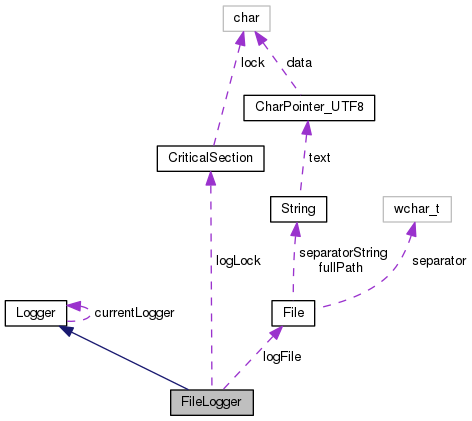A simple implementation of a Logger that writes to a file.
More...
#include <juce_FileLogger.h>
A simple implementation of a Logger that writes to a file.
- See also
- Logger
◆ FileLogger()
| FileLogger::FileLogger |
( |
const File & |
fileToWriteTo, |
|
|
const String & |
welcomeMessage, |
|
|
const int64 |
maxInitialFileSizeBytes = 128 *1024 |
|
) |
| |
Creates a FileLogger for a given file.
- Parameters
-
| fileToWriteTo | the file that to use - new messages will be appended to the file. If the file doesn't exist, it will be created, along with any parent directories that are needed. |
| welcomeMessage | when opened, the logger will write a header to the log, along with the current date and time, and this welcome message |
| maxInitialFileSizeBytes | if this is zero or greater, then if the file already exists but is larger than this number of bytes, then the start of the file will be truncated to keep the size down. This prevents a log file getting ridiculously large over time. The file will be truncated at a new-line boundary. If this value is less than zero, no size limit will be imposed; if it's zero, the file will always be deleted. Note that the size is only checked once when this object is created - any logging that is done later will be appended without any checking |
◆ ~FileLogger()
| FileLogger::~FileLogger |
( |
| ) |
|
◆ createDateStampedLogger()
| static FileLogger* FileLogger::createDateStampedLogger |
( |
const String & |
logFileSubDirectoryName, |
|
|
const String & |
logFileNameRoot, |
|
|
const String & |
logFileNameSuffix, |
|
|
const String & |
welcomeMessage |
|
) |
| |
|
static |
Helper function to create a log file in the correct place for this platform.
The filename used is based on the root and suffix strings provided, along with a time and date string, meaning that a new, empty log file will be always be created rather than appending to an exising one.
The method might return nullptr if the file can't be created for some reason.
- Parameters
-
| logFileSubDirectoryName | the name of the subdirectory to create inside the logs folder (as returned by getSystemLogFileFolder). It's best to use something like the name of your application here. |
| logFileNameRoot | the start of the filename to use, e.g. "MyAppLog_". This will have a timestamp and the logFileNameSuffix appended to it |
| logFileNameSuffix | the file suffix to use, e.g. ".txt" |
| welcomeMessage | a message that will be written to the log when it's opened. |
◆ createDefaultAppLogger()
| static FileLogger* FileLogger::createDefaultAppLogger |
( |
const String & |
logFileSubDirectoryName, |
|
|
const String & |
logFileName, |
|
|
const String & |
welcomeMessage, |
|
|
const int64 |
maxInitialFileSizeBytes = 128 *1024 |
|
) |
| |
|
static |
Helper function to create a log file in the correct place for this platform.
The method might return nullptr if the file can't be created for some reason.
- Parameters
-
| logFileSubDirectoryName | the name of the subdirectory to create inside the logs folder (as returned by getSystemLogFileFolder). It's best to use something like the name of your application here. |
| logFileName | the name of the file to create, e.g. "MyAppLog.txt". |
| welcomeMessage | a message that will be written to the log when it's opened. |
| maxInitialFileSizeBytes | (see the FileLogger constructor for more info on this) |
◆ getCurrentLogger()
| static Logger* Logger::getCurrentLogger |
( |
| ) |
|
|
staticnoexceptinherited |
Returns the current logger, or nullptr if no custom logger has been set.
◆ getLogFile()
| const File& FileLogger::getLogFile |
( |
| ) |
const |
|
inlinenoexcept |
◆ getSystemLogFileFolder()
| static File FileLogger::getSystemLogFileFolder |
( |
| ) |
|
|
static |
Returns an OS-specific folder where log-files should be stored.
On Windows this will return a logger with a path such as: c:\Documents and Settings\username\Application Data\[logFileSubDirectoryName]\[logFileName]
On the Mac it'll create something like: ~/Library/Logs/[logFileSubDirectoryName]/[logFileName]
- See also
- createDefaultAppLogger
◆ logMessage()
| void FileLogger::logMessage |
( |
const String & |
message | ) |
|
|
virtual |
This is overloaded by subclasses to implement custom logging behaviour.
- See also
- setCurrentLogger
Implements Logger.
◆ outputDebugString()
| static void Logger::outputDebugString |
( |
const String & |
text | ) |
|
|
staticinherited |
Writes a message to the standard error stream.
This can be called directly, or by using the DBG() macro in juce_PlatformDefs.h (which will avoid calling the method in non-debug builds).
◆ setCurrentLogger()
| static void Logger::setCurrentLogger |
( |
Logger * |
newLogger | ) |
|
|
staticnoexceptinherited |
Sets the current logging class to use.
Note that the object passed in will not be owned or deleted by the logger, so the caller must make sure that it is not deleted while still being used. A null pointer can be passed-in to reset the system to the default logger.
◆ trimFileSize()
| static void FileLogger::trimFileSize |
( |
const File & |
file, |
|
|
int64 |
maxFileSize |
|
) |
| |
|
static |
This is a utility function which removes lines from the start of a text file to make sure that its total size is below the given size.
◆ writeToLog()
| static void Logger::writeToLog |
( |
const String & |
message | ) |
|
|
staticinherited |
Writes a string to the current logger.
This will pass the string to the logger's logMessage() method if a logger has been set.
- See also
- logMessage
◆ logFile
◆ logLock
The documentation for this class was generated from the following file:

